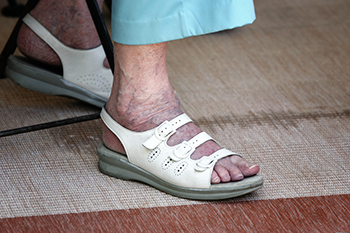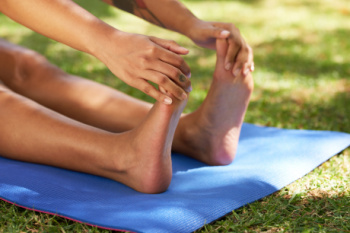Connect With Us
Blog

Poor circulation can cause significant issues for hikers, especially in the feet and ankles where blood flow is already challenged by prolonged standing and walking. Peripheral vascular disease and venous insufficiency can reduce the ability of blood to travel efficiently. This may cause cold feet, numbness, tingling, swelling, and muscle fatigue during or after a hike. These symptoms can make hiking uncomfortable and may increase the risk of injury or delayed healing. Poor circulation also increases vulnerability to cold-related foot problems, as inadequate blood flow prevents proper warmth from reaching the extremities. A podiatrist can evaluate circulation problems in the feet and ankles and recommend appropriate medical treatment to manage symptoms and help improve blood flow. Paying attention to persistent numbness, swelling, or pain is important when hiking. If you are experiencing foot, toe, or ankle problems from hiking, it is suggested that you schedule an appointment with a podiatrist for appropriate treatment.
While poor circulation itself isn’t a condition; it is a symptom of another underlying health condition you may have. If you have any concerns with poor circulation in your feet contact David Cain, DPM of Iowa. Our doctor will treat your foot and ankle needs.
Poor Circulation in the Feet
Peripheral artery disease (PAD) can potentially lead to poor circulation in the lower extremities. PAD is a condition that causes the blood vessels and arteries to narrow. In a linked condition called atherosclerosis, the arteries stiffen up due to a buildup of plaque in the arteries and blood vessels. These two conditions can cause a decrease in the amount of blood that flows to your extremities, therefore resulting in pain.
Symptoms
Some of the most common symptoms of poor circulation are:
- Numbness
- Tingling
- Throbbing or stinging pain in limbs
- Pain
- Muscle Cramps
Treatment for poor circulation often depends on the underlying condition that causes it. Methods for treatment may include insulin for diabetes, special exercise programs, surgery for varicose veins, or compression socks for swollen legs.
As always, see a podiatrist as he or she will assist in finding a regimen that suits you. A podiatrist can also prescribe you any needed medication.
If you have any questions, please feel free to contact our office located in Ames, Iowa . We offer the newest diagnostic and treatment technologies for all your foot care needs.

Foot pain is a frequent complaint among elderly individuals and can significantly affect mobility and independence. One common cause is hallux valgus, a deformity of the big toe joint that often leads to bunions, swelling, and discomfort when walking. Abnormal structure of the medial arch can also contribute to pain, especially if the arch is excessively high or collapsed, placing extra strain on other parts of the foot. Neurological disorders, such as peripheral neuropathy or spinal issues, can lead to altered sensation, burning pain, or muscle weakness in the feet. These conditions often interfere with balance and walking. If you are a senior or caring for an older person and have foot pain, it is suggested that you visit a podiatrist who can treat various foot conditions.
If you need your feet checked, contact David Cain, DPM of Iowa. Our doctor will attend to all of your foot and ankle needs and provide you with quality treatment.
Geriatrics and Podiatry
When people age, some common issues that may occur are bone density loss, dry skin, poor circulation, and rough brittle nails. These issues may also affect your foot health if the necessary steps are not taken to alleviate the problems.
It is important to take care of your feet because feet that are injured or diseased can affect your overall health. Having painful feet hinders your ability to do daily activities or may decrease your willingness to do the things that you need to do.
Visiting Your Geriatrician
As we age, health problems become more likely, so it is essential to visit your doctor for check-ups to ensure that you are doing the best you can to take care of your health. It is recommended to check your feet frequently for any possible cuts, bruises, swelling, corns or any other irregularities.
Taking Care of Elderly Feet
Cracked or dry feet can be treated by applying moisturizer often. It is also important not to wear old socks because the older the sock is, the higher the possibility there will be that there is bacteria there. Wear fresh socks and make sure they fit properly.
Proper foot health means that you can have a more active lifestyle and you will not be bogged down by pain. Foot health also leads to good circulation, which is paramount for overall health.
If you have any questions, please feel free to contact our office located in Ames, Iowa . We offer the newest diagnostic tools and technology to treat your foot and ankle needs.

Tight ankles, tight calves, and foot pain are common issues that can affect daily movement and overall comfort. Regular foot exercises can help improve flexibility, increase circulation, and reduce discomfort. Gentle stretching of the calves and ankles helps release tension and improve range of motion. Rolling the foot over a small ball or a frozen water bottle can massage the arch and ease soreness. Toe raises and heel lifts strengthen the muscles that support the foot and ankle, providing greater stability. Additionally, practicing controlled ankle circles can also enhance mobility. These exercises can be done at home and require minimal equipment. If you have foot pain, it is suggested that you consult a podiatrist who can guide you toward effective foot stretches for relief.
Exercising your feet regularly with the proper foot wear is a great way to prevent injuries and build strength. If you have any concerns about your feet, contact David Cain, DPM from Iowa. Our doctor can provide the care you need to keep you pain-free and on your feet.
Exercise for Your Feet
Exercise for your feet can help you gain strength, mobility and flexibility in your feet. They say that strengthening your feet can be just as rewarding as strengthening another part of the body. Your feet are very important, and we often forget about them in our daily tasks. But it is because of our feet that are we able to get going and do what we need to. For those of us fortunate enough to not have any foot problems, it is an important gesture to take care of them to ensure good health in the long run.
Some foot health exercises can include ankle pumps, tip-toeing, toe rises, lifting off the floor doing reps and sets, and flexing the toes. It is best to speak with Our doctor to determine an appropriate regimen for your needs. Everyone’s needs and bodies are different, and the activities required to maintain strength in the feet vary from individual to individual.
Once you get into a routine of doing regular exercise, you may notice a difference in your feet and how strong they may become.
If you have any questions please feel free to contact our office located in Ames, Iowa . We offer the newest diagnostic and treatment technologies for all your foot and ankle needs.

